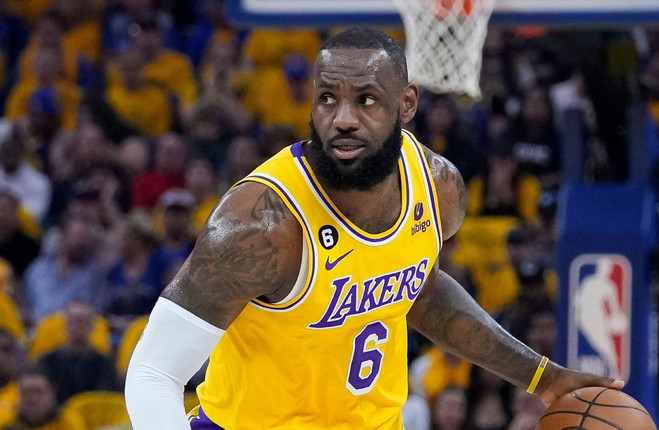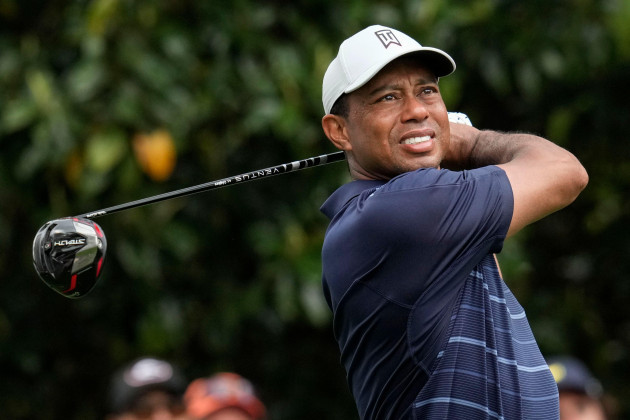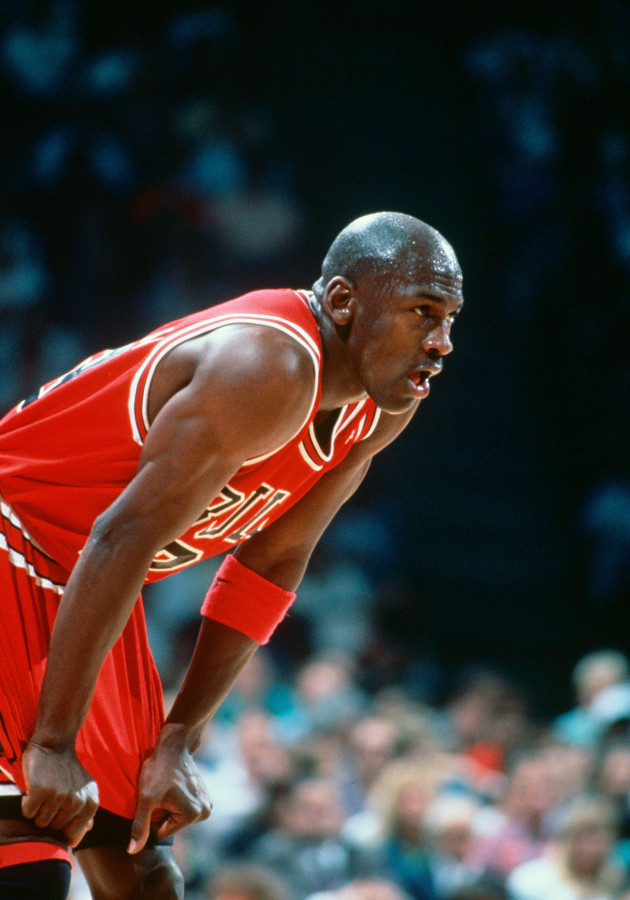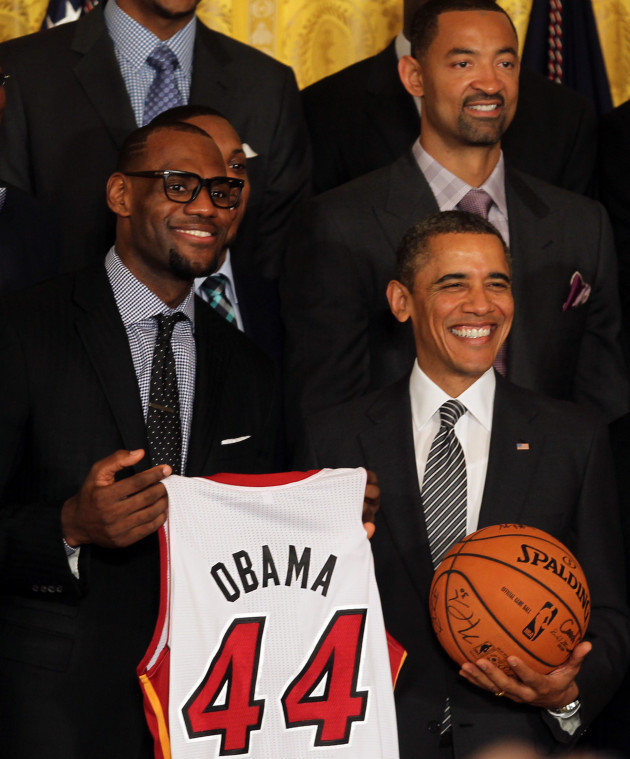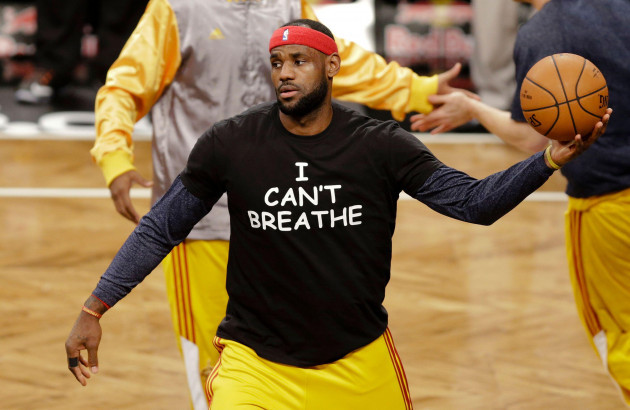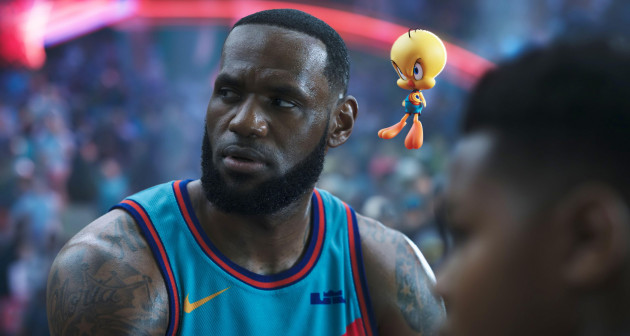LEBRON JAMES is widely considered one of the greatest basketball players of all time.
Whether his achievements have eclipsed those of fellow superstar Michael Jordan is a source of frequent debate.
The 38-year-old still regularly stars for the Los Angeles Lakers and is the NBA’s all-time leading points scorer as well as the first active basketball player to become a billionaire.
His achievements include four NBA championships, four NBA Most Valuable Player awards, 19 NBA All-Star accolades and two Olympic gold medals (won in 2008 and 2012).
A new biography by Jeff Benedict, a #1 New York Times bestselling author and writer of 17 non-fiction books highlights how this superstar was formed from a turbulent upbringing in Akron, Ohio, living in poverty with a single mother before being placed into a foster family who first introduced him to the pleasures of basketball.
And the book also explores why his popularity transcends the world of sports. He counts Bill Gates, Warren Buffett and Jay Z among his most high-profile friends. He has more than 100 million followers on social media. He produces and sometimes stars in Hollywood films and television shows.
Politically, he is also considered one of the most outspoken athletes on the planet. He uses his significant profile to speak out on issues often surrounding racism and social justice. He publicly backed Barack Obama’s successful presidential election campaign and has clashed with Donald Trump among other right-wing figures over the years.
‘LeBron’ consequently is the result of three years of exhaustive research and over 250 interviews, as Benedict delves into the iconic athlete’s remarkable story with the considerable level of depth, detail and insight it deserves.
The 42 recently caught up with the author to chat about his latest book…
What made you decide to write the book?
I think it just boils down to Tiger Woods, Tom Brady and LeBron James are the three most dominant male athletes to come out of America in the 21st century. And they’re the three athletes that have the biggest footprint outside the United States on more of an international stage.
And I’d already written about Tiger and done his biography. With Brady, I covered him in ‘The Dynasty.’ And so LeBron sort of closes the circle.
How did the experience compare to co-writing the Tiger Woods book with Armen Keteyian? They’re two very different characters.
Yeah, they are very different. They were raised in dramatically different ways. And in different places, geographically in the country, in terms of the kinds of neighbourhoods and surroundings that they were in, and their home life was very different.
And so to me, Tiger turned out to be incredibly successful in a sport that was more suited to the way he was raised.
Golf is a solitary game and requires the golfer to spend a lot of time alone, a lot of quiet time. And Tiger was raised that way.
LeBron is the opposite of that. He hates to be alone. And basketball suits his personality very well. He’s a team builder. He collects friends. And I think that is also traceable back to the way he was raised. So there are so many differences.
I think the one common denominator between Tiger and LeBron is the way they perform. They’re in a class by themselves. And it’s because they are simply more competitive, more driven, and you could argue more gifted than any of their competitors.
I mean, part of it is nature, right? You can’t discount the fact that LeBron had natural abilities, starting with his body, shape and size, his athleticism, those are the sort of things he was born with.
Tiger had some natural gifts as well. But then when it comes to taking those gifts and developing them to the point of being so extremely good at what they do, that takes a tremendous amount of work and I would argue obsession. An obsession with greatness is what separates them from everyone else.
Do you think LeBron can’t become LeBron without that incredibly tough, impoverished upbringing, or is that too simplistic way of looking at it?
Well, I mean, Michael Jordan became Michael Jordan with a different upbringing than LeBron, and so I think it’s hard to make those kinds of generalisations, I just think you have to look at each case on an individual level.
And I think in LeBron’s case, it’s very clear. And that’s why I structured the book the way I did and spent so much time on the origin story, because I think in his case, the origin story is connected to the way he approaches basketball, the way he plays the game, the drive and determination that he has, he’s never lost the hunger for the hard work, he’s never gotten lazy.
And I think that’s what’s so rare, to see a player that’s been playing for 20 years now, and never lost the edge.
What happens to a lot of great athletes is once they reach the top of the mountain, they take their foot off the gas.
It’s hard to maintain that kind of drive. You need so much acceleration to get to the top of the mountain. And once you get there, there’s a natural inclination to finally take a breath, to let your foot off the pedal, to just sort of take it in. LeBron has never done that.
He’s been at the top of the mountain for 20 years. And he’s never looked around and thought: ‘Well, I made it, I can relax now.’
And I think that is very much connected to where he came from and so in his case, the upbringing is critical to understand what motivates him to keep going because that’s a common question here in the United States: ‘What does he have left to prove? Why is he still playing at age 38 and going through the rigours of a long basketball season? What drives him?’
And the reason people have trouble understanding it is because they don’t understand where he came from. Once you know where he came from, it’s easier to see why he doesn’t want to stop.
The identity of LeBron’s father remains unclear. How big a factor was his absence in LeBron’s life?
Lots of people grow up fatherless. I mean, I was fatherless for the first eight years of my life. And so there are plenty of people who grew up fatherless, and they can have different impacts on different people, and in LeBron’s case, he wondered who his dad was and where he was and why he wasn’t around. And it bothered him a great deal.
When he finally got exposed to young boys his age who had fathers, and whose fathers were very active in their lives, that was something that LeBron was drawn to, it was very appealing to him.
But it also heightened his awareness that he didn’t have that. And so I think to it resulted in two things.
Number one, he watched these fathers very closely, and the way they acted as dads. In other words, he looked at them as models. And they didn’t realise they were modelling for him, but they were.
And secondly, when LeBron became old enough to become a father himself, I think one of the most impressive things about him — in my mind, it’s more impressive than what he’s done on the basketball court, which is saying something — is the way he has performed as a father.
In America, it’s been incredible to watch that because LeBron’s parenting has been centre stage through most of his career, particularly now as his children are getting older, and he’s less concerned about shielding them from the public.
When they were little, he put a shield around them and didn’t let any reporters around them or anything, but now his kids are out there more. They’re on social media, they’re more visible. And I just think that the way LeBron parents is very much connected to the fact that he grew up without a dad.
I know from speaking to Armen a few years ago that you had a negative experience dealing with Tiger’s people for that book. How was it this time around, did you get any feedback from LeBron’s camp during or after writing it?
So the way I would answer that is in a general way, which is to say, Tiger was antagonistic as Armen and I were trying to research and write his biography. LeBron was the opposite of that.
And he didn’t sit for interviews. He did not participate in any way in the biography process. But he also didn’t put up hurdles, or make it difficult for me to do research and do my job as a biographer. And that was a significant difference that was apparent from the beginning.
I say this all the time, most biographies are written about people who are dead. When you’re writing a biography about a living subject, particularly a living subject that’s at the peak of their career, you shouldn’t expect them to cooperate.
If they wanted you to write their biography, they would commission you. They would hire you, and they would pay you to write it and it would be called an autobiography. And I’ve done that, I did it with Steve Young, the quarterback from the 49ers.
But when you’re doing it on your own, and you’re writing an unauthorised biography, you shouldn’t expect the subject to sit.
The real question is: how will they handle your approach to other people that have interacted with them and had experiences with them in their lifetime? And that’s where the difference between LeBron and Tiger was more noticeable.
Would it be fair to describe LeBron’s relationship with the media as love-hate and has it changed over the years?
Well, I think LeBron, at least in my view, has had a healthy relationship with the media his entire life.
I mean, LeBron was interacting with national media in the United States from the time he was 15 years old. He was profiled in the New York Times when he was 15. I mean, that’s extraordinary.
When he was 16, he was interacting with Sports Illustrated. When he was 17, he was on ESPN, and his high school games were being televised in front of national audiences.
So while he was a teenager, he got an unusual amount of exposure to the biggest media outlets in America. In his professional career, LeBron has been exposed and covered probably more than any other athlete in America.
And so I think when you consider that, you have to tip your hat to how good he’s been with the media.
Now, naturally, as he’s evolved as a player, and as a celebrity, he’s become much more protective of his access, meaning he does all the mandatory press conferences, and speaks to the writers and reporters who cover the NBA.
But he doesn’t do a lot of sit-down interviews where he opens up for big profiles anymore because LeBron has reached a point where he has his own outlets. He owns a television show. He owns a film and TV studio in Los Angeles in Hollywood. He has ways to get his message out through Twitter and Instagram, where he has more followers than [almost] any athlete in the world.
And so given the change in the media landscape, LeBron doesn’t have any filters anymore because he controls the way his message gets out. And I’m not critical of that, I compliment it, I think that’s really smart. And it’s a tribute to what he’s achieved.
You deal in the early parts of the book with LeBron’s reluctance to get involved with the China-Darfur controversy that was intensifying in the run-up to the 2008 Olympics, whereas he subsequently endorsed Obama in the US Presidential Election and has been publicly critical of Donald Trump more recently. So would you say he has evolved as a political activist over the years?
It’s a great question, and I think, this is where context is really important. LeBron’s childhood idol was Michael Jordan. And Michael Jordan was famous for avoiding politics, and social activism at every step of his career. He famously said: ‘Republicans buy sneakers too.’ And when he said that, it caused civil rights leaders in America to boycott Nike products.
And so Jordan had a contentious relationship with civil rights leaders and activists. And there were a lot of civil rights leaders who were quite disappointed with Jordan when he was playing basketball because he wouldn’t touch anything politically.
When LeBron entered the league, Jordan was now retired. And in the early years of his career, LeBron was a lot like Jordan in the sense that he also didn’t get involved in anything political.
But you also have to remember, and this is the context I was referring to earlier — when LeBron entered the league, he was much younger than Michael was when Michael entered the league. And so when the Darfur Crisis with China came up with Lebron, he was 22 years old and it came up because LeBron was going to be playing in the Beijing Olympics with Team USA.
This went on for two years because the political activists who were trying to put pressure on China started [raising awareness] almost two years before the Olympics.
And so initially, when LeBron was pressured to speak out against China, for the genocide in Darfur, LeBron did nothing.
And the reason it became an issue in America was that all of his teammates on the Cleveland Cavaliers signed a letter that called out China for the genocide. LeBron didn’t sign it. And as a result in America, he was roundly criticised by the media throughout the country.
By the time the Olympics took place, in the summer of 2008, when LeBron got to Beijing, he and Kobe Bryant spoke to the press in Beijing. And they both essentially said the same thing, which was, you shouldn’t mix politics and sports.
LeBron got a lot more criticism than Kobe did for saying that. By this time, he was 23 years old. So in my mind, he’s a young man who’s never really thought much about political activism.
The turning point for LeBron happens later that year when they win the gold, they come back from Beijing, and Barack Obama is running for president in the United States.
And that fall, only a few months after the Olympics, Jay Z invites LeBron to join him on stage where he’s basically doing a benefit concert for Barack Obama.
And LeBron gets up on stage in Cleveland and endorses Barack Obama and encourages the entire audience to vote for him. That was the moment when he first stepped into the political arena.
And of course, Obama wins the election. And over the next eight years, LeBron James has a lot of access and exposure to President Obama and First Lady Michelle Obama.
And it’s during those eight years that LeBron matures and evolves as a political activist, so that by the time Obama leaves in 2016, and Trump comes into office, LeBron is a much different, more nuanced, and much more aware, individual than he was eight years earlier in Beijing.
And you see it much more demonstrably because he is speaking out on all kinds of things like gun violence, civil rights, voting, voting rights, and he goes toe to toe with President Trump on several issues during the Trump years. And that’s what pushes LeBron to the forefront of politics in America, he becomes the most visible athlete in America on the political stage.
And I think that’s a dramatic difference between him and Michael Jordan, as Jordan never evolved. When Jordan retired, he was still the same guy that he was when he was a rookie in terms of avoiding politics.
Whereas LeBron makes a tremendous evolution to the point where he’s showing other athletes, not just basketball players, but athletes across the board in America, Olympic athletes, baseball players, football players, and soccer players, he’s showing everyone how they can use their voice to affect political outcomes.
Would you go so far as to call him a trailblazer in that regard? Because I can’t think of many athletes who, for example, would have had the courage to take the lead in wearing that ‘I Can’t Breathe’ t-shirt during the height of the Eric Garner controversy, or certainly not athletes of his stature?
Yeah, I think there’s no question he’s a trailblazer. What’s impressive about it is he took the time to figure out who he was and what he stood for, and which issues he would engage on. He’s specific about the things that he engages in.
There have been a couple of iconic moments with him. One was when a young man in America was gunned down, after wearing a hooded sweatshirt and wandering into the wrong neighbourhood in Florida, and he was shot and killed.
And LeBron then orchestrated a photograph where he and his teammates, they all wore hooded sweatshirts. And LeBron never said anything about it. He just posted the photo on Twitter, where he has over 50 million followers. It had a tremendous impact.
And then after that, he wore the ‘I Can’t Breathe’ t-shirt, which was a reference to another African American man in the United States, who was choked to death by a police officer, these were progressive attempts by LeBron to bring attention to some very significant social issues in the United States. And he’s continued to do that over the last 10 years.
And as a result of that, it’s also made him more controversial. There’s a segment of America that doesn’t like LeBron because he’s been willing to speak out. I mean, Fox News has really gone after him. Laura Ingraham basically went on TV and said: ‘Shut up and dribble.’ And that was her way of basically trying to intimidate LeBron into keeping his mouth shut. And of course, he turned that around and used it to bring even more awareness to the problem.
What do you think is next when he eventually does retire? Do you see a future in politics or possibly Hollywood films?
Well, I think LeBron already has a huge presence in Hollywood. Most athletes who try to get into Hollywood do it after they retire.
And very few of them are successful. I mean, you can count on one hand, the number of American athletes who have actually made the transition from sports to movies and done it well. There are only a few. LeBron is the only athlete I can think of who ventured into Hollywood while he was at the peak of his career.
So LeBron’s had a footprint in Hollywood now for more than a decade. He has a real production company that is making movies, television shows and podcasts. And they have a studio. I mean, they’re making things now.
He’s acted in movies already. He’s been in television shows. So LeBron is already in Hollywood. And he lives in Hollywood and plays for the Lakers. So I think when he retires, whenever that is, there’s not going to be much of a transition on the Hollywood side, because he’s already doing it.
I think the real question is, does he go into politics? That’s a bigger question. And I would not speculate or project, I would only say, I think it’s an avenue that’s open to him if he ever decides he wants to go that direction because he’s certainly capable of being successful in that sphere if he wants to, but I have no idea if that interests him.
What will his legacy be?
I think his legacy is going to be a lot different than Jordan’s. I mean, the two of them are always going to be compared to each other, and the question will never go away: which one is the greatest of all time?
Right now, I think the consensus in America leans towards Jordan. I’m not sure if that’ll be the case 50 years from now, people may look at that very differently than they do right now.
But I think with Lebron, his legacy is not going to be limited to basketball, Jordan’s legacy is basketball. And that’s fine. There’s nothing wrong with that.
But LeBron’s legacy is going to be more multi-dimensional, because of what he has done in all of these other venues: politics, social justice, arts and entertainment, fashion. He has stepped into all of these other ventures. And so I think that that’s the legacy that that he’s going to have ultimately, I mean, people will talk about LeBron for a whole host of things besides basketball, he’s much more of a cultural world figure because he’s been willing to step in [to other areas].
I think of him more in the same conversation as Muhammad Ali, who became a world figure for things besides boxing. He was a world-champion boxer. And so from an athletic standpoint, initially, the whole world knew him as a great fighter.
But over time, his reputation and his legacy became so much broader than that. We remember him now as a great civil rights leader. We remember him as the athlete who lost his championship belt and was prosecuted for refusing to enter the draft and fight in the Vietnam War.
There are all these other things about Ali, that historically, we now look back at him as a much broader figure than just a great athlete. And I think LeBron will be in that category.
‘LeBron’ by Jeff Benedict is published by Simon and Schuster. More info here.
